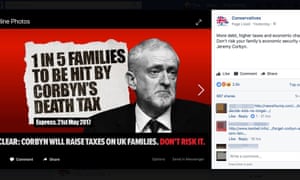Revealed: Tory ‘dark’ ads targeted voters’ Facebook feeds in Welsh marginal seat
Unregulated practice discovered after posts attacking Jeremy Corbyn drown out campaign aimed at boosting youth vote One of the anti-Labour ‘attack’ ads posted on Facebook by the Conservatives, focusing on the Delyn marginal constituency. Photograph: Facebook
One of the anti-Labour ‘attack’ ads posted on Facebook by the Conservatives, focusing on the Delyn marginal constituency. Photograph: Facebook
The Observer has obtained a series of Conservative party attack ads sent to voters last week in the key marginal constituency of Delyn, north Wales. Activists captured the ads using dummy Facebook accounts after finding that their own ad – encouraging young people to register to vote – were being “drowned out” by the Tory ads.
The Conservatives have refused to supply examples of adverts the party is sending to individual voters on Facebook, despite growing concern over unregulated online election activity.
Following a series of articles in the Observer concerning the use of data by Vote Leave and Leave.EU during last year’s referendum, the Information Commissioner’s Office has launched a wide-ranging investigation over possible breaches of UK data laws.
Charlotte Gerada, a public affairs manager at Shelter, told the Observer that she and a friend had raised £13,000 in a few days with the idea of increasing the turnout among 18- to 25-year-olds in key marginals.
“We looked at the seats where we thought we could make the biggest impact and created materials aimed at encouraging young people to vote. We calculated that if only half of those who clicked on the adverts decided to go out and vote Labour, we could still make a real difference.
“We used Facebook’s ‘lookalike’ audience tool to find young people, and initially our adverts in Delyn were both our cheapest and our best-performing. But the day before the voter registration deadline, the price of the ads shot up. We had been paying around £1.08 a click before and it spiked to more than double that. At one point it was up to £3.40 a click. The way that Facebook ads work is that you ‘bid’ for the slots... so if the price shoots up, it means someone else is bidding against you for the same slot.”
Quentin Johns, a Facebook marketer who was advising the campaign, told them to set up dummy accounts with the same profile and geographic location of the voters they were targeting to try to figure out who was competing against them. In Delyn, they discovered ads from the Conservative party were being displayed in place of theirs.
Johns said: “There’s only limited ad space on Facebook, so if you’re targeting a particular demographic in a particular area and have a lot of money, you can simply drown out other advertisers. And that’s what was happening. The ads encouraging people to vote were wiped out by these adverts.”
Gerada said: “It was the last day it was possible to register to vote this week and it wasn’t just us trying to reach people – there were a lot of charities and organisations trying to do this. What really shocked me is the nature of the adverts. There’s one about Labour’s ‘death tax’ which was taken from an article in the Express which is just scaremongering.
“It just seems astonishing that these are dark ads, that no one officially sees, and they can just put whatever they want in them. There’s no regulation: it’s all hidden. And it just seems like it’s not really democracy, if all this is going on in total darkness.”
Gerada’s findings come as more and more problems with digital campaigning are being unearthed. Martin Moore, director of the Centre for the Study of Media, Communication and Power at King’s College London, contributed to an LSE study in April that called for an “urgent review” of UK electoral law. The report said existing laws could no longer “ensure a level playing field” – the fundamental principle on which UK campaigning laws are based.
Moore said that there were serious questions to be asked about Vote Leave’s data and that the Conservatives’ refusal to disclose their adverts undermined the entire democratic process.
“Campaigning in secrecy is enormously destructive of the basic principle of democracy. If you are not engaging people openly, you cannot be challenged, and you cannot be held to account. It’s not possible to hold politicians to their promises.
“The more this is done, the more democracy loses its legitimacy. It’s already looking pretty unhealthy. Large numbers of people are questioning whether it’s sustainable, and this just takes us further down that road. Democracy cannot function in darkness.”
Asked about the particular adverts Gerada had found, he described them as “dirty politics”. David Hanson, of Labour, is defending the seat in Delyn and will lose it if there is a 3.9% swing to the Tories. He said: “It feels pretty symptomatic. We’re running a local campaign, talking to people about local issues on the ground, whereas the Conservatives are using these national adverts, run at a national level, and are actively trying to suppress the turnout in a number of ways.
“We will have to see which strategy works, but these ads are all just about negative stuff, whereas we believe people want to debate the big issues and have proper face-to-face discussions, and that’s what we’re doing.”
The Observer is looking for volunteers to help monitor hidden political advertising. If you can help, please email observer.elections2017@gmail.com
Geen opmerkingen:
Een reactie posten
Opmerking: Alleen leden van deze blog kunnen een reactie posten.